I fully admit that home organization is the bane of my existence. If you’re a hard-core reader of this site or a listener of the Spawned podcast then you know that while Kristen is an avid purger, I’m what I like to think of, fondly, as a Nostalgic Hoarder.
It’s like not you’re going to find me one day, buried under 25-year old newspaper clippings, old coffee cans and pounds of cat hair. But I do have trouble getting rid of my kids’ early doodles (they’re so sweet!); birthday cards from every relative ever (maybe my kids will want them); textbooks I haven’t read since college (they were expensive!). Then all that not-so-nostalgic, I-might-need-it-one-day stuff that I never actually need. You know, like the free t-shirts with the logos on them, the store-brand lice shampoo that never worked, and a ridiculous collection of reusable canvas tote bags.
Not even kidding. We call them “the bags of bags” around our home: Large reusable bags simply filled with other, smaller reusable bags.
But they’re all my very favorites!
I know for a fact I’m not alone here, because we get so many questions from you all about organization and decluttering tips. So this week on Spawned with Kristen and Liz, we spent a lot of time discussing advice we had researched from five top organizational experts.
What are their theories? What are their top tips? And realistically, have they worked for us and can they work for you?
Take a listen on iTunes, Stitcher, or right here via Soundcloud for a really good, honest discussion with lots of advice. And see the general tips below, with links to the topics we discussed.
1. Peter Walsh
This master of decluttering has been seen on Oprah, Rachel Ray, Clean Sweep on TLC, and tons of best-selling books including Lighten Up: Love What You Have, Have What You Need, Be Happier with Less . His entire theory is about the joy of living with less — a theme you’ll see that’s pretty pervasive across all the expert advice here. However the way he approaches it is interesting. He believes that if you focus on the stuff, you’ll never get organized, because what you really need a change in lifestyle or underlying issues.
Understand that when you buy a product, you may be investing in a promise — buying weights isn’t about buying weights, but investing in the premise of being healthy, fitting in your old clothes, looking great in sleeveless shirts, showing up your rival at your tenth year high school reunion. In other words, we all probably own products we don’t need, which we purchased because we want to be the kind of person who…gets exercise/plays golf on the weekend/uses a three-step face cleaning ritual/makes homemade bread for our kids.
There’s a lot to this idea, and I’ve seen it in action with people in my own life — people who hold onto golf clubs they haven’t used for 10 years not exactly because “they might use them one day,” but deep down, they want to identify as the kind of person who plays golf.
In order to purge unused items, remind yourself that donating a breadmaker doesn’t mean that you’re not a good parent. It just means you’re not using your breadmaker.
I find this really valuable to keep in mind when I’m having trouble getting rid of things.
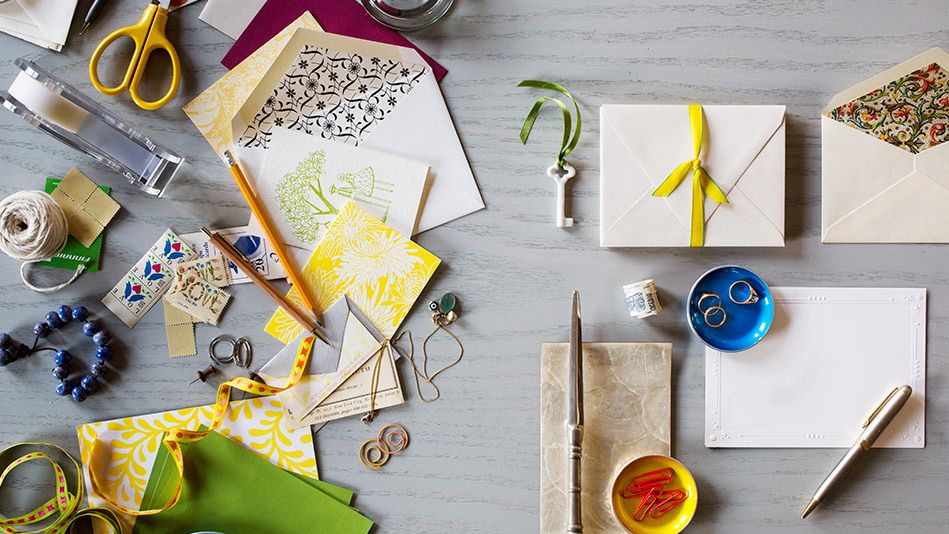
Image via Oprah.com
Peter’s tips: Wow, he has so many. But one we touched on in the podcast that could be helpful for parents: Have each person (or person old enough to help) in your household take out two trash bags each day for a week. Set a timer for 10 minutes, and fill one with garbage, one with items to donate. If you have 3 people doing this, you’ll have 42 bags of stuff after just one week to get out of your house.
Helpful links: Peter Walsh’s YouTube Channel including his 31 days to get organized series for 2016.
Decluttering tips on Sparefoot in which he identifies two types of clutter: Memory clutter, and I-might-need-it-one-day clutter. (Uh, I can relate to both. Clearly.)
He details 5 types of clutter styles on Oprah. Which is yours?
5 easy ways to recycle or donate your old phones and technology
2. Gretchen Rubin
She’s always got great thoughts about organization on her blog and her podcast, and we’ve written before about Gretchen Rubin’s Power Hour idea for tackling your to-do’s, which has really inspired us. In fact, we covered it on our post about 5 small tasks to add to your tech to-do list to help get organized.
Her premise is that those things you want to do to get organized generally fall to the bottom of your list, replaced by whatever “emergency” or essential task seems more pressing.
Next thing you know, it’s been years and you still haven’t put stray photos in albums, tossed all those expired medicines, fixed your favorite necklace’s broken link, checked gift card balances, or taken that jar of change to the coin machine in the bank. Even though doing those things may give you tremendous satisfaction.
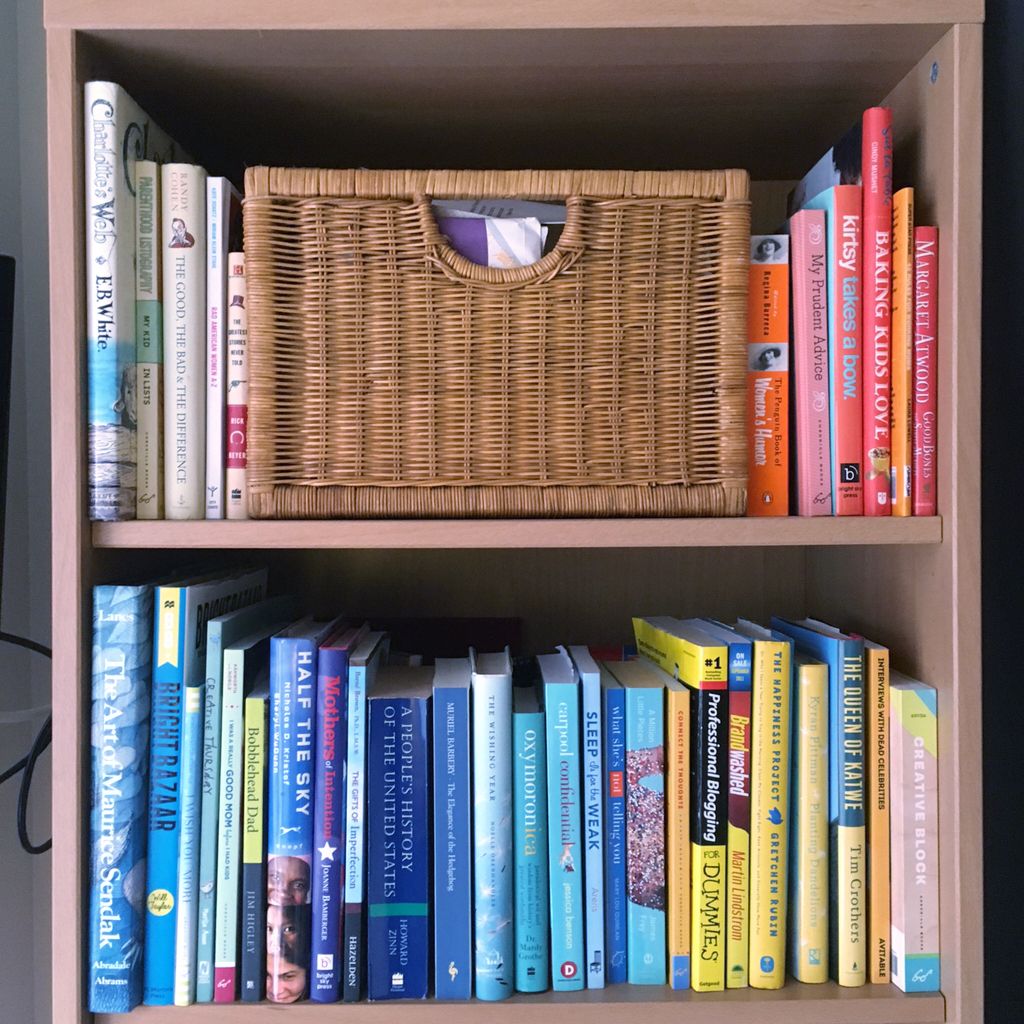
I used to be the type who rolled my eyes at bookshelves organized by color and not size or topic — but turns out I am happy every single time I look in the direction of my bedroom bookshelf, and I’m glad I spent the hour. And look: The Happiness Projec is right there!
Gretchen’s Tips: The Power Hour involves scheduling in one hour for organization a week. The trick is, you can only use that hour for non-essential tasks that don’t have deadlines.
I’ve tried this — I actually organized my bookshelf by color, and cleaned out a whole junk drawer — and it turns out that not only was I so happy when it was done, but I continue to feel happy every time I look at that bookshelf, or go to the kitchen to find a picture hook…and actually find it. It may be hard to find that hour but when you do, the results are so satisfying.
Gretchen, you’re always right, lady!
Helpful Links: About the Power Hour
The one-minute rule to keep you from drowning in clutter.
9 common myths about decluttering
How outer order leads to inner calm
3. Marie Kondo
The Konmari method of tidying blew up in 2015, and we put it to the test and wrote about it pretty candidly — what works, what doesn’t. Her belief is that most organizers are hoarders, just helping you move things around or hide them instead of really decluttering. So she advocates living more minimally, and decluttering by only surrounding yourselves with those items that spark joy.
There’s a lot more to her theories, and it’s worth reading the book to dig deeper, but this is pretty much its essence.
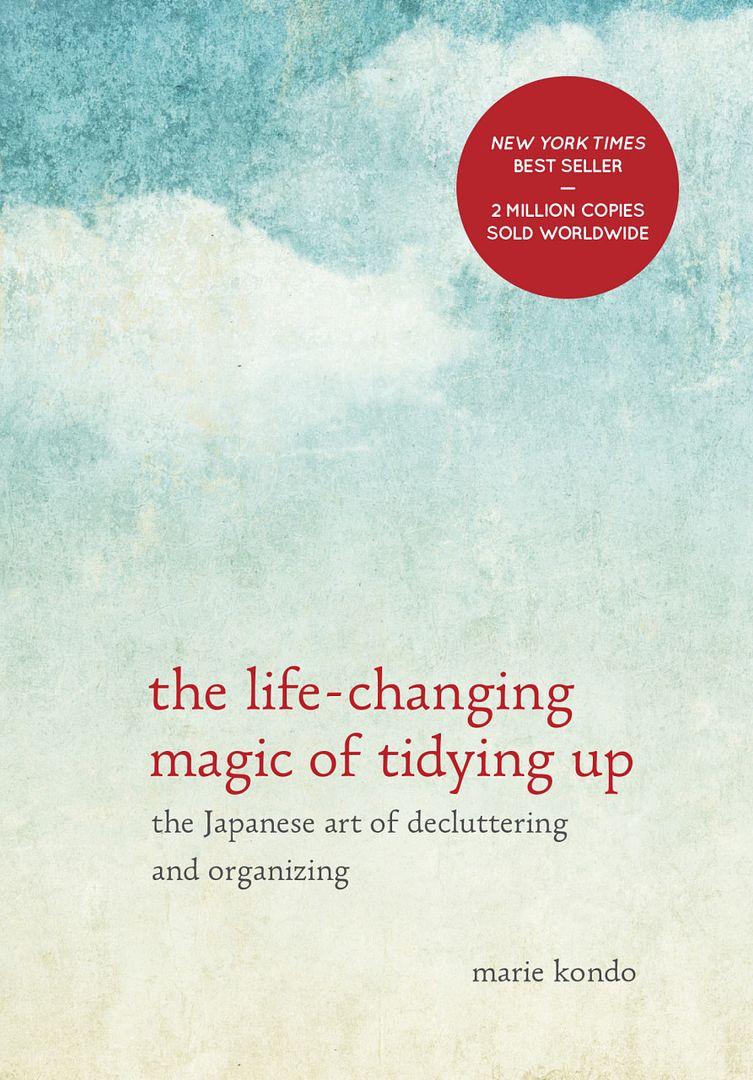
Marie’s tips: Take all your items by category (clothes, books, toys) and not by room. Put them all on your bed or on the floor together. Then hold them up one by one and simply ask yourself, “does this spark joy?” If not, thank it for its service and let it go. Also, be sure there’s only one place for every item in your home (pencils, scissors, makeup) — though we do take issue with how realistic this is, especially for parents.
It may sound a little new-agey but this is the very first decluttering or organization method that really worked for me in a big, big way! I share all the details on the podcast (aw, poor Max Mara Dress from 1999).
Kristen brings up the fact that sometimes it’s hard to get rid of so many things at once, especially because it makes you feel that it’s wasteful. This is where you can combine her method with Peter Walsh’s tip about letting go of the guilt of having bought something at one time that you didn’t really need; and recognize that keeping an item around for reasons of guilt is in direct contrast with keeping it around for reasons of joy.
Guilt does not spark joy! And neither does a dress you haven’t fit into in 15 years. Sniff.
Helpful links: The Life-Changing Magic of Tidying Up (Amazon affiliate link)
BIG HINT: Get the ebook on Kindle for less clutter!
Her new book just out, Spark Joy: An Illustrated Master Class on the Art of Organizing and Tidying Up
4. Andrew Mellen
Called “The Most Organized Man in America,” Kristen met him at the Dad 2.0 social media conference and was really influenced by his notion that we have to distinguish ourselves from our possessions — a common theme we’re seeing among some of these amazing experts. His main premise is that disorganization creates stress, and that as you slowly manage to get organized, you feel better too.
He’s given a compelling TedX talk about How Stuff Robs our Time and as a parent himself, his tips for decluttering feel very accessible to us.
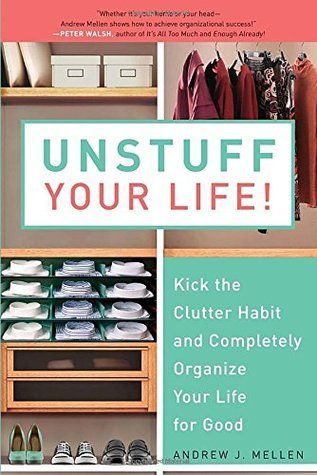
Andrew’s tips: To keep things decluttered, use the “one in, one out” method. If one board game, stuffed animal, wooden spoon, or pair of shoes comes in the house, then get one out of the house too.
Also, it’s essential that everything has its place. Knowing where the remote controls go each time they’re not in use is a great way to tame clutter before it starts — and a fantastic way to get kids to help. Plus, having one single place for your keys means you won’t spend time and energy ever searching for them again. I like that!
Like Marie Kondo, Andrew also talks about items that bring joy, and letting go of the past as a way of letting go of unused items that clutter up your home. He says that if you have to tell yourself something in order to hang onto an item — like it would hurt the feelings of your aunt who gave you that kangaroo planter, or how much you liked it when you were younger — think instead about whether it informs who you are today and not in the past.
Sorry, old Ini Kamoze CD.
Helpful Links: His book, Unstuff Your Life
How Andrew learned to let go of stuff
11 tips for organizing clothes and closets
And hey! He even recommended Kristen’s own post on 5 tips for organizing your homeschool room
5. Ashley Murphy and Molly Graves
We discovered these two professional organizers from Neat Method, thanks to an article on organizing tips on Oprah.com. They are yet another pair who’s about figuring out why you have clutter in the first place and addressing the underlying issues, and so they’ve created three different clutter personalities.
Now we do discuss that there are probably more than three, but their points are well taken. First, there’s someone who’s too busy, which translates to having too many extras; in other words, you don’t even know how much Scotch tape or how many mechanical pencils you have, so you buy more. The next personality is the constant worrier who hangs onto things because they might need them one day. Though I don’t think you’re necessarily a worrier when you use that rationale — however you should ask yourself really honestly whether you really, truly will need it, especially if past evidence is that you never have needed it.
Their third personality type is those who are overwhelmed with life, and so they’ve just conceded to living with more chaos than is necessary.
That’s when I realized…oh man. That’s me. Ouch.
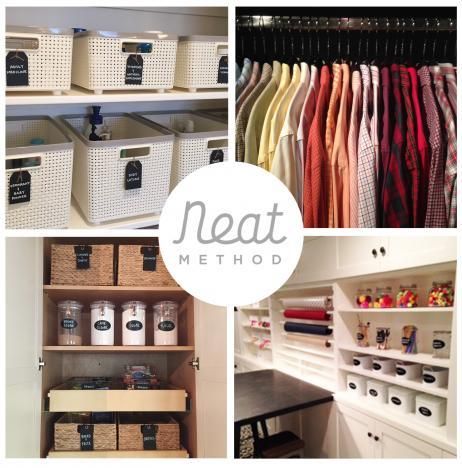
Ashley and Molly’s tips: Because they’re organizers, their perspective is more about how to physically store and organize things in your home. However they do suggest that in an effort to get organized, we often overbuy storage containers before first doing a thorough purge. So don’t start with buying bins! However, when it is bin time, go to the store knowing exactly what you need, measurements in hand, and where it will go so you’re not creating more clutter through storage materials that are extraneous or don’t fit.
They also smartly suggest taking a photo of the items you are seeking to organize (junk drawer, cutlery, big mess of art supplies) so when you’re at a store, you can remember exactly what you’re going to need storage space for, and how much of it.
Links: Neat Method website
6 things professional organizers want you to know
Inspiration: Neat’s 2015 neatest spaces
Other links from the show:
-Episode 8 featuring Kristen’s dating deal-killers
–7 cool cord management solutions on Cool Mom Tech
-NY Times: Barbara Reich organizes the homes of NYC’s elite
-Liz’s cool pick of the week: Just Dance 2016
-Kristen’s cool pick of the week: Car detailing. Really!
To hear more, just listen right here or click over to Spawned with Kristen and Liz on iTunes — and don’t forget to subscribe to our feed! It’s fun!
If you want to join in on the conversation, email us at spawned@mompicksprod.wpengine.com (we love all of your emails and questions!) or catch us on Facebook or Twitter using the hashtag Spawned Show.
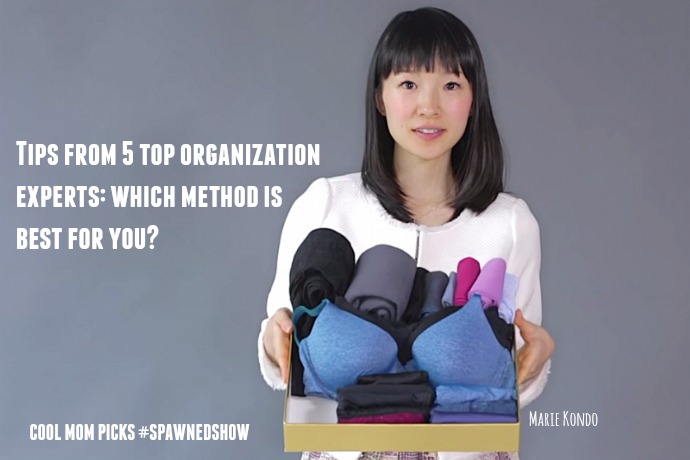


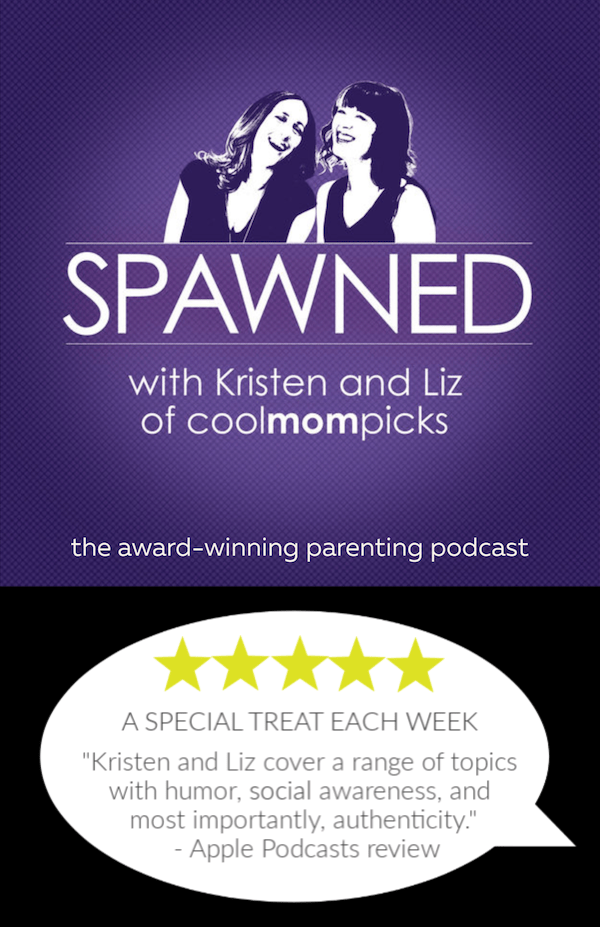

Great tips.
Almost all the tips are pretty much implementable. I was fascinated by the fact that each of these people have their own books, which I would definitely want to check out.
Truthfully speaking, I am not the “cleaning” type of person but lately, all the mess around me has been stressing me out. Need to get rid of it. This would definitely help.
Thanks. 🙂
Great ideas. Thanks for sharing these.
I recently moved, I thought that I was very well organized, and I also thought that I had rid my home of unused clutter!! Then we unpacked (or tried) our stuff!! Almost 2 years later and I have overwhelmed myself with trying to get organized “a little every day”, that does not and will not ever work!
I went to Barnes and Noble and stumbled across Marie Kondo’s book “The life changing magic of tidying up”, oh my gosh, stress relief!! I am not exactly where I need to be just yet, however, I have a better understanding of how to get there!
I have conceded to the fact that I fit the “guilt keeper” personality of keeping things (clutter), I also have a slight bit of to busy, with a twist of overwhelmed!
I am so grateful for the men and women (mentioned in the above article), and others I have sought out), for spending countless hours on providing us with these wonderful, stress relieving organizational techniques, my only regret is that I didn’t have this information in the younger years of my children!
I am working on teaching an organizational techniques class in our community continued education program!!